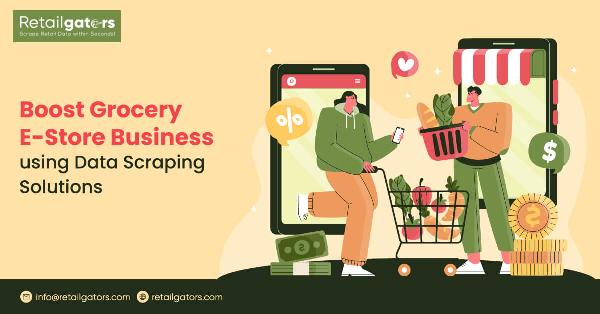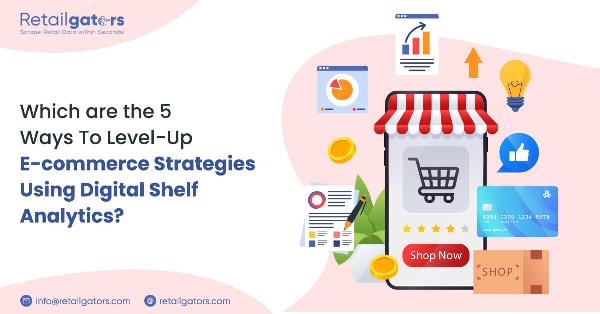The Role of Real-Time Price Monitoring in Grocery E-Commerce

Strong 8k brings an ultra-HD IPTV experience to your living room and your pocket.
The rise of online shopping has significantly changed how people buy things, including food and groceries. This has changed what people expect when they shop and how the food market works.
Experts predict that the US online grocery market will grow significantly, reaching about $223 billion by 2025. This growth is being pushed by changes caused by the pandemic and rising prices, which are making more people shop online for convenience and good deals. Big grocery brands and companies make sure they have a strong presence on popular websites where people shop, their own websites where you can buy directly from them, and apps for ordering groceries.
Pillars Of Success In The Digital Grocery Industry
Large grocery brands and companies that make things like household products have been innovative about using online platforms. Let's break down the seven key pillars for succeeding in the digital grocery industry in simpler terms:
Smooth User Experience
Make sure your online grocery store is easy for people to use. This means having a website or app that's easy to navigate works well on phones and lets customers find what they want quickly. Also, make sure it's easy for them to buy things and get help if they need it.
Diverse Product Selection
Offer a wide variety of products in your online store. Keep an eye on what's popular and what customers want so you can make sure to have those items available.
Effective Supply Chain Management
Make sure you have a good system for managing your inventory and getting products to customers quickly. This means keeping track of what you have in stock, restocking items promptly, and making sure deliveries are fast and reliable.
Data-Driven Decision Making
Use information about how customers behave and what they buy to make smart decisions. Look at sales trends like prices, promotions, and marketing strategies with Web Scraping.
Personalized Marketing
Tailor your marketing to fit each customer's preferences. Use data to create special deals and offers that are just right for each person. This helps keep customers interested and coming back to your store.
Integration of Technology
Use the latest technology to improve your online store. This might include things like using computers to help manage your inventory or using special software to make the shopping experience smoother for customers.
Adaptive Pricing Strategies
Change your prices based on what's happening in the market and what customers are doing. Keep an eye on what your competitors are charging and adjust your prices to stay competitive while still making a profit. This helps you stay flexible and respond to changes in the market.
Key Concerns While Buying Groceries
Today, people who buy groceries have different things they care about. These can depend on their age, how much money they have, and other factors. Here are some essential things, both for stores and for people who shop:
Product Quality
People want good-quality products that are unique and different from other players. They want fresh groceries which taste good and are worth their price. Stores need to make sure they're selling high-quality things to keep customers happy and coming back.
Pricing and Value
Money matters to people, especially when things are uncertain. They like getting good deals and saving money while buying groceries online. Stores should offer fair prices and deals that give customers good value for their money.
Convenience and Accessibility
People like things that are accessible and easy to order as per their requirements. They want to be able to buy groceries without too much hassle, whether it's online or in a store nearby. Stores should make it easy for people to shop, with things like quick checkouts and different ways to get their groceries.
Customer Experience
People want shopping to be a good experience and to be satisfied when they are using digital sources. They like it when stores treat them well and help them find what they need. Stores should focus on making customers happy by giving them good service and making shopping easy and enjoyable.
Sustainability and Social Responsibility
People highly care about their surroundings and how companies treat their workers and communities. Stores can stand out by doing things like using eco-friendly products, reducing waste, and supporting good causes.
Innovation and Adaptability
Things are constantly changing, so stores need to keep up with the advancements in the market. They need to try new things and use new technology to stay ahead. Stores should be flexible and open to new ideas to keep customers interested and happy.
Factors Affecting Grocery Shopping Experience
For businesses, it's essential to know how well they're doing financially. They use things like sales growth, market share, and sales efficiency to analyze their performance. These drivers show what customers want and what's happening in the grocery market, which is always changing and very competitive. Businesses that do a good job with these drivers often do well in the rankings and are more likely to succeed in online shopping.
Price and Discounts
During festivals, shoppers pay extra attention to the prices of groceries. Especially when shopping online, they're looking for the best deals they can find. Our research shows that discounts on food and groceries are substantial to shoppers. So, showing off good deals on essential products, using smart pricing tricks, and even giving rewards like cash back or special discounts to loyal customers are all ways to keep people interested in your store.
Product Quality
When we analyze product quality, it involves a lot of different things. It's not just about how good the food tastes or how fresh it is. Quality also means how clean and nice the store is, how well customers are treated, and even things like how nice the packaging looks. For store brands, they try to show off quality through things like how the product looks on the shelf or how the store feels when you're inside.
Digital Presence
In the digital world, having a good website and online store is super important for any shop to do well. If a store's website is easy to use, lets customers find what they want quickly, and offers different ways to pay and get their grocery items delivered, then more people will want to shop there. It's also essential to give customers recommendations on what to buy and help them out if they have questions while shopping online.
Operations
Running a store smoothly involves lots of factors that are responsible for providing a smooth shopping experience to customers, like making sure there's enough of everything in stock and organizing the layout of the store so it's easy for customers to find what they need. On the website, it's essential to have clear pictures and descriptions of products and to make sure prices and product availability are always up-to-date. If the store doesn't manage this well, it can upset customers, and they might go somewhere else to shop.
Convenience and Speed
Being close to where customers live, having a large selection of products, and offering trendy things can make a store popular. But now that everyone can shop online, it's imperative to offer fast and convenient delivery options. Making it easy for customers to pay and return things they don't want also helps. Different people care about different things, but for a lot of younger shoppers, quick delivery is essential. So, stores need to find ways to offer lots of different services while still being fast and efficient.
Strategies For Success In The Grocery Industry
The digital shelf has become a crucial source of information for both product details and pricing, creating a competitive environment for retailers. To attract digital shoppers, retailers must address the challenges of an increasingly discerning consumer base. Creating a high-value perception becomes essential as more people shift to online shopping.
Emphasizing Flexible Delivery Options
Retailers can attract shoppers by offering various delivery options that help them save money in response to rising prices. Prioritizing convenience through user-friendly online stores and adaptable payment plans is crucial. This allows retailers to develop pricing strategies and discounts that resonate with budget-conscious consumers.
The Emergence of Smaller Retailers
Brands like NetGrocer and FreshDirect have made a significant impact in the online grocery delivery business segment. It showcases the competitiveness of these businesses against industry giants. Forming strategic partnerships with delivery services like Doordash and Instacart, as well as offering innovative services like curbside pickups, contributes to alternative growth in sales. This highlights the importance of having a presence across multiple channels.
Utilizing Technology for Optimization
Technology plays a pivotal role in helping grocers optimize their operations. From data analytics to dynamic pricing, technology enables futuristic business initiatives such as customer insights, assortment planning, and promotion optimization. Dynamic pricing, in particular, allows retailers to adjust prices in real-time, as demonstrated by industry leaders like Amazon.
Making Data-Driven Decisions
In the digital era of shopping, data analytics remains critical for retailers. Leveraging solutions like price optimization software streamlines the process by automating retail pricing and inventory management. By analyzing market trends and utilizing AI-enabled technology to evaluate competitive pricing and price elasticity, retailers can make informed decisions to stay ahead of the competition.
Remaining Competitive
Succeeding in the grocery industry requires a multifaceted approach. Retailers like Trader Joe's, Amazon, Costco, and Wegmans have risen to the top by prioritizing both financial performance and emotional connection. As the industry evolves, a commitment to innovation, integrating technology, and forming strategic partnerships will continue to define the success stories of grocery retailers in the digital age.
Conclusion
Grocery shopping on online websites boosts a grocery store's digital presence. Businesses can strengthen their online presence by gathering crucial information on prices, product trends, and how customers behave. This data-driven method helps them make smart decisions, like changing prices when needed, creating personalized marketing, and improving the shopping experience for users.
Source: https://www.retailgators.com/boost-grocery-estore-business-using-data-scraping-solutions.php
Note: IndiBlogHub features both user-submitted and editorial content. We do not verify third-party contributions. Read our Disclaimer and Privacy Policyfor details.



